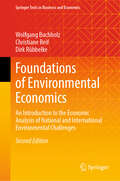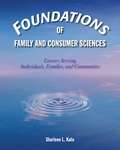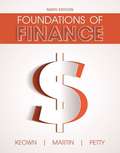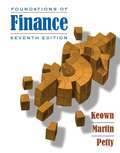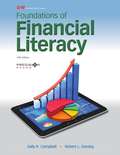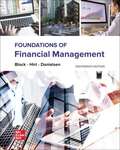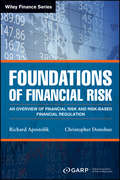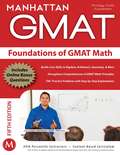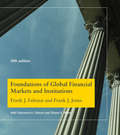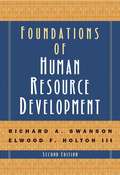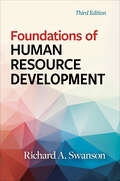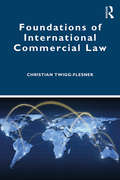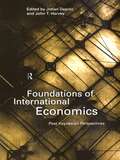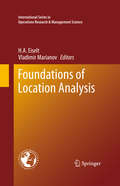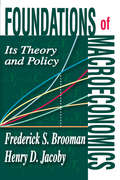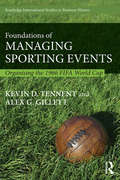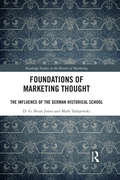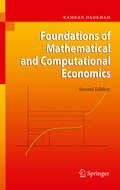- Table View
- List View
Foundations of Entrepreneurship and Economic Development (Routledge Foundations Of The Market Economy Ser.)
by David A HarperThis well-written book is the first to deal with entrepreneurship in all its aspects. It considers the economic, psychological, political, legal and cultural dimensions of entrepreneurship from a market-process perspective. David A Harper has produced a volume that analyses why some people are quicker than others in discovering profit opportunities
Foundations of Environmental Economics (Springer Texts in Business and Economics)
by Wolfgang Buchholz Dirk RübbelkeThis textbook provides a solid introduction to the theoretical and empirical aspects of environmental economics, and their links to environmental policy. It advocates drawing on the economist’s toolbox as a powerful means of finding solutions to environmental problems by addressing the conflict between the societal costs of pollution on the one hand, and the financial costs of emissions reduction on the other. The book presents the main economic theory approaches to handling environmental problems and assessing the monetary value of environmental quality; the most relevant environmental policy instruments and challenges involved in their effective real-world application; and both national and global environmental problems addressed by environmental negotiations and agreements. Given its scope, the book offers a valuable basis of information for students, and for policymakers pursuing effective environmental policies.
Foundations of Environmental Economics: An Introduction to the Economic Analysis of National and International Environmental Challenges (Springer Texts in Business and Economics)
by Wolfgang Buchholz Dirk Rübbelke Christiane ReifThis textbook provides a solid introduction to the theoretical and empirical aspects of environmental economics and their links to environmental policy. In this second edition, all chapters have been updated and restructured, and new sections have been added to reflect a greater focus on climate policy. Starting from the need to balance the social costs of pollution against the financial costs of emission abatement, the book discusses the major issues that arise in the context of environmental policy – such as the potential and limitations of monetary valuation of the environment (and in particular the contingent valuation method) and the design of environmental policy. With regard to the choice of environmental policy instruments, the book focuses on the price-based instruments preferred by economists, i.e., environmental taxes and emissions trading, discussing in detail not only their many advantages but also their drawbacks. The second edition especially focuses on green industrial policy as a complementary measure to price-based instruments, the distributional effects of environmental policies, and the resulting challenges for political feasibility. Moreover, the book deals extensively with international environmental problems, in particular climate protection, which is a global public good that will be underprovided when certain countries refuse to cooperate and contribute. Approaches to overcoming this underprovision are described in far more detail than in the first edition, both theoretically and empirically – in particular by assessing the functions of the many international environmental agreements in this field. Finally, a new chapter considers adaptation strategies, especially in the water sector, as an additional pillar of climate policy.
Foundations of Family Resource Management
by Elizabeth B. GoldsmithFoundations of Family Resource Management uses the lenses of consumer science, management, and economics, and beyond to help students make intelligent decisions about resources, time, and energies at the individual and family level. It has a strong interdisciplinary, global, and multicultural focus. This sixth edition brings in new material on millennials, delayed marriage, household composition, neuroscience, behavioral economics, sustainable consumption, technology, and handling crises. It has been updated in line with the latest census data and academic literature. The text contains lots of features to support student learning, including chapter summaries, "Did You Know?" questions, glossary of key terms, examples and cases, critical thinking activities, and review questions for discussion and reflection. Lecture slides and an instructor manual are available as digital supplements. This textbook meets the standards and criteria for the Certified Family Life Educator (CFLE) designation of the National Council on Family Relations (NCFR) and will be suitable for resource management courses in family and consumer science, human ecology, and human environmental science programs.
Foundations of Family and Consumer Sciences: Careers Serving Individuals, Families, and Communities
by Sharleen Gay KatoFoundations of Family and Consumer Sciences is a college-level textbook designed to introduce students to the family and consumer sciences profession. An overview of the profession, including history and trends is presented. Career opportunities for each family and consumer sciences specialization area are explored and come to life in Professional Profiles and Issues in the News features. The text guides students in how to move into the workplace and how to make a difference in the lives of others.
Foundations of Finance: The Logic and Practice of Financial Management
by John Martin Arthur Keown J. PettyFoundations of Finance retains its foundational approach to the key concepts of finance, bolstered by real-world vignettes, cases, and problem exercises. Utilizing five principles, which are presented at the beginning of the book and applied throughout, the authors introduce a multi-step approach to financial problem solving that appeals to readers’ at all levels, math and numerical skills. As in previous editions, the Ninth Edition focuses on valuation and opens every chapter with a vignette based on financial decisions faced by contemporary, real-world companies and firms. Other highly useful features include mini cases, cautionary tales, lists of key terms, and a discussion of ethics. Revised and updated, the newest edition includes new lecture videos, financial thinking, user feedback, and lessons from the recent economic crisis.
Foundations of Finance: The Logic and Practice of Financial Management (7th Edition)
by John D. Martin Arthur J. Keown John W. Petty J. William PettyFoundations of Finance enables students to see the big picture by letting them understand the logic that drives finance rather than having them memorize formulas. The book motivates the study of finance with a focus on five underlying principles.
Foundations of Financial Management
by Geoffrey A. Hirt Bartley Danielsen Stanley B. BlockFoundations of Financial Management has built a loyal following due to its strong real-world emphasis, clear writing style, and step-by-step explanations that simplify difficult concepts. As the field of finance has become much more analytical, the text focuses on the "nuts and bolts" of finance with a clear and thorough treatment of concepts and applications. The authors emphasize decision-oriented approaches rather than the old, descriptive approach. They have also stayed with their basic mission of making sure students can follow their discussions throughout the text. Block, Hirt, and Danielsen have always been devoted to producing a high-quality text by writing the entire book and all the problems themselves. The authors know what works and what doesn't work for students, and they have consistently maintained a product that is responsive to the demands of the marketplace.
Foundations of Financial Management (Fourteenth Edition)
by Stanley Block Geoffrey Hirt Bartley DanielsenFoundations of Financial Management has built a loyal following due to its strong real-world emphasis, clear writing style, and step-by-step explanations that simplify difficult concepts. The text focuses on the "nuts and bolts" of finance with clear and thorough treatment of concepts and applications. In addition to completing the textbook revisions, Block, Hirt, and Danielsen also revise all end of chapter problems and complete the solutions themselves. The authors know what works and what doesn't work for students, and they have consistently maintained a high quality textbook that is responsive to the demands of the marketplace.
Foundations of Financial Management (Sixteenth Edition)
by Geoffrey A. Hirt Stanley B. Block Bartley R. DanielsenFoundations of Financial Management has built a loyal following due to its strong real-world emphasis, clear writing style, and step-by-step explanations that simplify difficult concepts. The text focuses on the "nuts and bolts" of finance with clear and thorough treatment of concepts and applications. In addition to completing the revisions, Block, Hirt, and Danielsen also revise all end of chapter problems and complete the solutions themselves. The authors know what works and what doesn't work for students, and they have consistently maintained a product that is responsive to the demands of the marketplace.
Foundations of Financial Risk: An Overview of Financial Risk and Risk-based Financial Regulation (Wiley Finance)
by GARP (Global Association of Risk Professionals) Richard Apostolik Christopher DonohueGain a deeper understanding of the issues surrounding financial risk and regulation Foundations of Financial Risk details the various risks, regulations, and supervisory requirements institutions face in today's economic and regulatory environment. Written by the experts at the Global Association of Risk Professionals (GARP), this book represents an update to GARP's original publication, Foundations of Banking Risk. You'll learn the terminology and basic concepts surrounding global financial risk and regulation, and develop an understanding of the methods used to measure and manage market, credit, and operational risk. Coverage includes traded market risk and regulation, treasury risk and regulation, and much more, including brand new coverage of risk management for insurance companies. Clear explanations, focused discussion, and comprehensive relevancy make this book an ideal resource for an introduction to risk management. The textbook provides an understanding of risk management methodologies, governance structures for risk management in financial institutions and the regulatory requirements dictated by the Basel Committee on Banking Supervision. It provides thorough coverage of the issues surrounding financial risk, giving you a solid knowledgebase and a practical, applicable understanding. Understand risk measurement and management Learn how minimum capital requirements are regulated Explore all aspects of financial institution regulation and disclosure Master the terminology of global risk and regulation Financial institutions and supervisors around the world are increasingly recognizing how vital sound risk management practices are to both individual firms and the capital markets system as a whole. Savvy professionals recognize the need for authoritative and comprehensive training, and Foundations of Financial Risk delivers with expert-led education for those new to risk management.
Foundations of GMAT Math
by Manhattan GmatManhattan GMAT'â TMs Foundations of Math book provides a refresher of the basic math concepts tested on the GMAT. Designed to be user-friendly for all students, this book provides easy-to-follow explanations of fundamental math concepts and step-by-step application of these concepts to example problems. With ten chapters and over 700 practice problems, this book is an invaluable resource to any student who wants to cement their understanding and build their basic math skills for the GMAT. Purchase of this book includes six months online access to the Foundations of Math Homework Banks consisting of over 400 extra practice questions and detailed explanations not included in the book.
Foundations of Global Financial Markets and Institutions, fifth edition (The\mit Press Ser.)
by Frank J. Fabozzi Frank J. JonesA thoroughly revised and updated edition of a textbook for graduate students in finance, with new coverage of global financial institutions.This thoroughly revised and updated edition of a widely used textbook for graduate students in finance now provides expanded coverage of global financial institutions, with detailed comparisons of U.S. systems with non-U.S. systems. A focus on the actual practices of financial institutions prepares students for real-world problems.After an introduction to financial markets and market participants, including asset management firms, credit rating agencies, and investment banking firms, the book covers risks and asset pricing, with a new overview of risk; the structure of interest rates and interest rate and credit risks; the fundamentals of primary and secondary markets; government debt markets, with new material on non-U.S. sovereign debt markets; corporate funding markets, with new coverage of small and medium enterprises and entrepreneurial ventures; residential and commercial real estate markets; collective investment vehicles, in a chapter new to this edition; and financial derivatives, including financial futures and options, interest rate derivatives, foreign exchange derivatives, and credit risk transfer vehicles such as credit default swaps. Each chapter begins with learning objectives and ends with bullet point takeaways and questions.
Foundations of Human Resource Development (2nd edition)
by Richard A. Swanson Elwood F. Holton IIIFor students, researchers, and practitioners, Swanson (human resource development, U. of Texas at Tyler) and Holton (human resource and leadership development, Louisiana State U.) provide a textbook on human resource development (HRD) that focuses on the fundamentals and foundations of practice that does not focus on best practices. Instead, it addresses models, processes, history, theoretical and philosophical foundations, learning and performance paradigms and models, the role of HRD in high-level organizational and systems-level issues, and training and development and organization development. This edition has been revised, updated, and expanded to include new chapters on component HRD theories, policy and planning, technology, and globalization. Annotation ©2009 Book News, Inc., Portland, OR (booknews.com)
Foundations of Human Resource Development: Profit for Your Workplace and the Environment
by Richard A SwansonThe third edition of this classic is a must-have text for the human resource development (HRD) profession. It has with brand-new material on the impact of technology, globalization, and emerging business trends on HRD practice.Human Resource Development is a large field of practice but a relatively young academic discipline. For the last two decades, Foundations of Human Resource Development has fulfilled the field's need for a complete and thoughtful foundational text. This essential text provides an up-to-date overview of the HRD profession, along with the terminology and processes required for sound HRD research and practice. Readers will gain a basic understanding of• HRD models and theories that support best practice • History and philosophical foundations of the field• HRD's role in learning, performance, and change in organizations This new edition has been updated throughout and contains new chapters on assessment, technology, globalization, and future challenges. Examples of best practices are included, along with variations in core thinking, processes, interventions, tools, and much more. This must-have reference will help both practitioners and academics add clarity to their professional journeys.
Foundations of International Commercial Law
by Christian Twigg-FlesnerFoundations of International Commercial Law provides a fresh analysis of both the contextual features of International Commercial Law and a range of different International Commercial Law instruments. This text covers the various elements which comprise International Commercial Law, the academic debates about the lex mercatoria and harmonisation, as well as a discussion of selected conventions and other instruments. International Commercial Law is concerned with commercial transactions which have an international dimension, for example contracts between parties from multiple jurisdictions. As an area of study, it is characterised by the interaction of a wide range of national and international legal sources which all shape the overall context within which international commercial contracts are made and performed. This book focuses on the international legal sources in particular. It first explores all the different elements which together comprise the context of international commercial transactions, before examining the process of making International Commercial Law. Specific instruments of International Commercial Law discussed in the book include the conventions on the international sale of goods, agency, financial leasing, factoring, receivables financing and secured interests in mobile equipment, together with the UNIDROIT Principles of International Commercial Contracts and documentary credits. There are separate chapters on private international law and international commercial arbitration, and a final chapter exploring the existing and potential impact of the digital economy on International Commercial Law. Offering a detailed overview of the main themes and key aspects of International Commercial Law, this book is for readers who are new to the subject, whether undergraduate or postgraduate students, legal scholars, practitioners or policymakers.
Foundations of International Economics: Post-Keynesian Perspectives
by John T. Harvey Johan DeprezThis unique collection presents a Post-Keynesian perspective on international economics and trade. All the major areas in international economics are covered, with the Post-Keynesian approach giving a welcome fresh perspective. The book is divided into five main sections: * foreign trade * open economy * international payments systems * exchange rate determination * development. Unavailable elsewhere, the readings present original, state-of-the-art research by leading Post-Keynesian scholars. Contributors include: Philip Arestis, Robert Blecker, Paul Davidson, Sheila Dow, Bruce Elmslie, Ilene Grabel John McCombie Eleni Paliginis, A.P. Thirlwall L. Randall Wray Johan Deprez, John T. Harvey,
Foundations of Location Analysis (International Series in Operations Research & Management Science #155)
by H. A. Eiselt Vladimir MarianovLocation analysis has matured from an area of theoretical inquiry that was designed to explain observed phenomena to a vibrant field which can be and has been used to locate items as diverse as landfills, fast food outlets, gas stations, as well as politicians and products in issue and feature spaces. Modern location science is dealt with by a diverse group of researchers and practitioners in geography, economics, operations research, industrial engineering, and computer science. Given the tremendous advances location science has seen from its humble beginnings, it is time to look back. The contributions in this volume were written by eminent experts in the field, each surveying the original contributions that created the field, and then providing an up-to-date review of the latest contributions. Specific areas that are covered in this volume include: * The three main fields of inquiry: minisum and minimax problems and covering models * Nonstandard location models, including those with competitive components, models that locate undesirable facilities, models with probabilistic features, and problems that allow interactions between facilities * Descriptions and detailed examinations of exact techniques including the famed Weiszfeld method, and heuristic methods ranging from Lagrangean techniques to Greedy algorithms * A look at the spheres of influence that the facilities generate and that attract customers to them, a topic crucial in planning retail facilities * The theory of central places, which, other than in mathematical games, where location science was born
Foundations of Macroeconomics
by Robin Bade Michael ParkinA practice-oriented learning system that breaks the traditional textbook mold. To help readers focus on the most important concepts--and effectively practice application of those concepts--Foundations of Macroeconomics is structured around a Checklist/Checkpoint system. The result is a patient, confidence-building textbook that prepares readers to use economics in their everyday life, regardless of what their future career will be.
Foundations of Macroeconomics: Its Theory and Policy
by Frederick S. BroomanEmphasizing careful, lucid explanation rather than the lavish use of cryptic graphs and mathematics, and combining the rigor of statement of the best American theoretical work with the extraordinary clarity of the best English scientific writing, this compact, readable, well-integrated work is a leading text for courses in macroeconomics. A completely rewritten version of Brooman's classic English text, the book has been revised and expanded specifically for use in the United States, with American examples and usages, and includes new chapters on money and monetary flows and their consequences. The book covers every aspect of economic theory dealing with the determination of total output and employment, the general price level, and the rate of economic growth. It examines theories of consumer behavior and business investment, the demand and supply of money and their effects on interest rates and the price level; the determination of the level of employment and wages; the possibilities of fluctuations in output and employment; and the forces making for growth of the economy. The effects of foreign trade on the domestic economy are brought in, and the possibilities of using government expenditure and taxation as a means of stabilizing the economy are examined. Theories of consumption, investment, trade, money and interest are tied together in a thorough discussion of income determination, and whenever possible, empirical evidence is produced as a check on theoretical relationships. Algebraic symbols are used as a space-saving device; none but the simplest algebra is employed, and readers with an elementary knowledge of mathematics will find no difficulty in following the argument of the book. It is organized for a one semester course, both in terms of the sequence of materials and the relative number, length, and difficulty of the chapters. The object throughout is to make the exposition highly readable and to provide clear definitions and explanations of the main concepts found in this important branch of economic theory. The result is a book of the highest level.
Foundations of Managing Sporting Events: Organising the 1966 FIFA World Cup (Routledge International Studies in Business History #33)
by Kevin D Tennent Alex G. Gillett2016 marks the 50th anniversary of the 1966 FIFA World Cup, hosted in England. Unlike previous literature, which has tended to focus activities on the field, this book brings an institutional level approach to organizing the 1966 FIFA World Cup and examines the management process in the buildup and execution of the event. This intriguing new volume looks at the first significant UK government intervention in football and how this created a significant legacy as the government started to take a real interest in leisure facilities and stadium safety as policy areas after this competition. Foundations of Managing Sporting Events will be of considerable interest to research academics working on aspects of post war British, Imperial, and World history including sport, social, business, economic, and political history.
Foundations of Marketing
by O. C. Ferrell William M. PridePopular with readers from all backgrounds and interest levels, FOUNDATIONS OF MARKETING, 6th Edition introduces you to the essentials and latest trends in marketing with strong visuals and stimulating, timely discussions. Meaningful coverage of current marketing strategies and concepts includes social media, entrepreneurship, sustainability, globalization, customer relationship management, supply chain management, and e-commerce models. Emerging topics, such as social and environmental responsibility, entrepreneurship, and marketing during transitional times depict the changing nature of business, keeping you in touch with and prepared for a competitive world. Illustrating the issues with captivating photos, screenshots, advertisements, and examples from real life, FOUNDATIONS OF MARKETING, 6th Edition also offers a variety of modern learning supplements, such as podcasts, videos, and an interactive marketing plan, to help you develop the practical decision-making skills you need for professional success.
Foundations of Marketing Thought: The Influence of the German Historical School (Routledge Studies in the History of Marketing)
by Mark Tadajewski D.G. Brian JonesThe study and teaching of marketing as a university subject is generally understood to have originated in America during the early 20th century emerging as an applied branch of economics. This book tells a different story describing the influence of the German Historical School on institutional economists and economic historians who pioneered the study of marketing in America and Britain during the late 19th and early 20th centuries. Drawing from archival materials at the University of Wisconsin, Harvard Business School, and the University of Birmingham, this book documents the early intellectual genealogy of marketing science and traces the ideas that early American and British economists borrowed from German scholars to study and teach marketing. Early marketing scholars both in America and Britain openly credited the German School, and its ideology based on social welfare and distributive justice was a strong motivation for many institutional economists who studied marketing in America, predating the modern macro-marketing school by many decades. Challenging many traditional beliefs, this book provides an authoritative new narrative of the origins of marketing thought. It will be of great interest to educators, scholars and advanced students with an interest in marketing theory and history, and in the history of economic thought.
Foundations of Mathematical and Computational Economics
by Kamran DadkhahThis is a book on the basics of mathematics and computation and their uses in economics for modern day students and practitioners. The reader is introduced to the basics of numerical analysis as well as the use of computer programs such as Matlab and Excel in carrying out involved computations. Sections are devoted to the use of Maple in mathematical analysis. Examples drawn from recent contributions to economic theory and econometrics as well as a variety of end of chapter exercises help to illustrate and apply the presented concepts.


